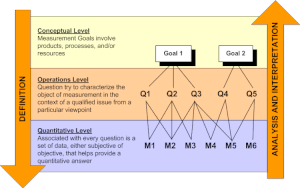


GQM, the initialism for goal, question, metric, is an established goal-oriented approach to software metrics to improve and measure software quality.[1]
GQM has been promoted by Victor Basili of the University of Maryland, College Park and the Software Engineering Laboratory at the NASA Goddard Space Flight Center[2] after supervising a Ph.D. thesis by Dr. David M. Weiss.[3] Dr. Weiss' work was inspired by the work of Albert Endres at IBM Germany.[4][5][6]
GQM defines a measurement model on three levels:[7]
Another interpretation of the procedure is:[9]
Sub-steps are needed for each phases. To complete the definition phase, an eleven-step procedure is proposed:[9]
The GQM+Strategies approach was developed by Victor Basili and a group of researchers from the Fraunhofer Society.[10] It is based on the Goal Question Metric paradigm and adds the capability to create measurement programs that ensure alignment between business goals and strategies, software-specific goals, and measurement goals.
Novel application of GQM towards business data are described.[11] Specifically in the software engineering areas of Quality assurance and Testing, GQM is used.[12]
{{cite web}}: Missing or empty |url= (help)
{{cite book}}: CS1 maint: location missing publisher (link)